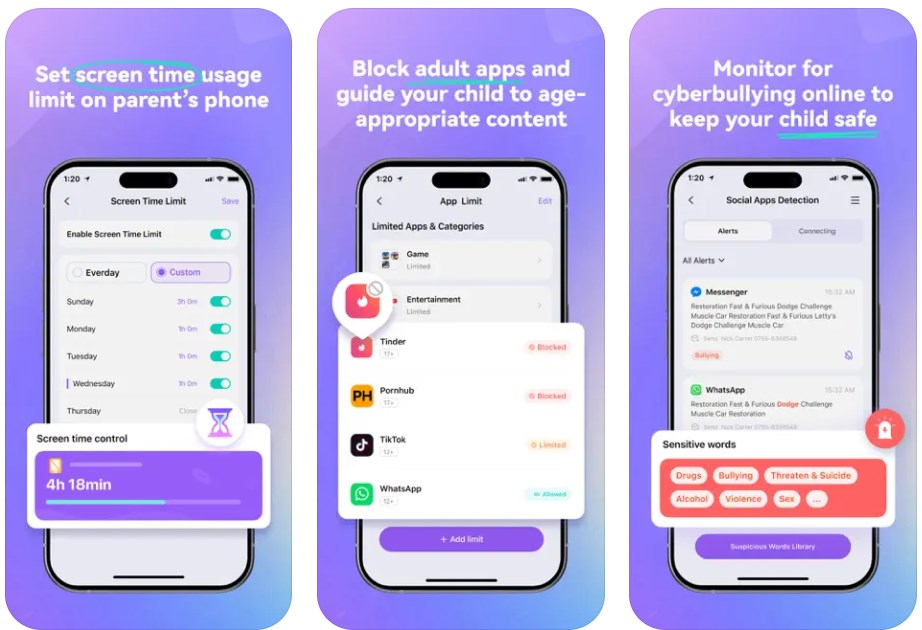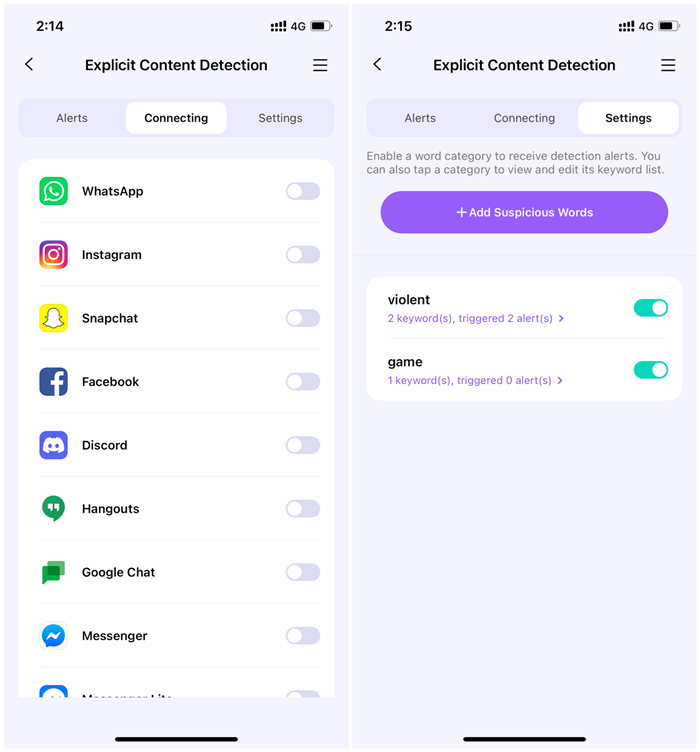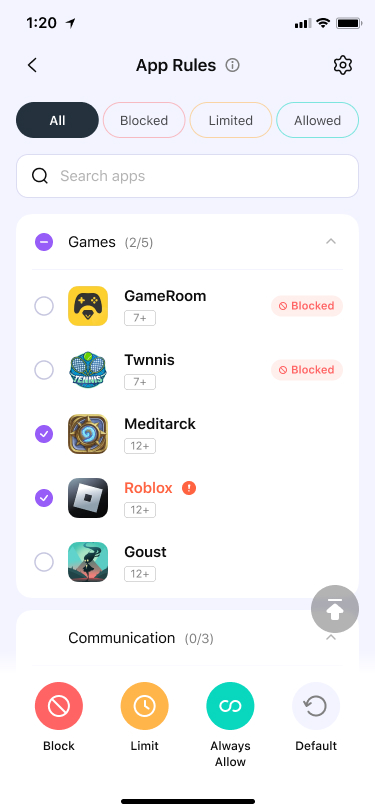
Catfishing is a form of online deception where a false online persona is used to engage with and manipulate someone emotionally or psychologically. Catfishing can have serious consequences for the victim, including emotional trauma, financial loss, and even physical harm. The dangers of catfishing include cyberbullying, identity theft, stalking, and exposure to inappropriate or illegal content.
Educating children about catfishing is crucial because they are one of the most vulnerable groups to this online deception. The anonymity of the Internet can make it difficult for children to distinguish between real and fake identities. Parents can protect their children's safety online from catfishing attempts by using parental control apps.
Table of Content
What Is Catfishing?
This section will discuss catfishing from a comprehensive perception, including its definition, legality, and forms. It will also explain why it can harm your children.
Definition of Catfishing
Catfishing is creating a fake online identity to deceive someone into a romantic or personal relationship. This deception can range from creating a completely fabricated identity to using someone else's photos and information without their consent. The practice of catfishing is often associated with online dating platforms and social media.

Why Is It Called Catfishing?
The term "catfishing" originated from a 2010 documentary called "Catfish," in which a man named Nev Schulman developed a romantic relationship with a woman he met online, only to discover that she had been using a fake identity. The woman had claimed to be an artist and had sent Nev elaborate paintings, supposedly painted by her. He later found out that the images were copied from a magazine.
In the documentary, Nev's friend compared the situation to how fishermen put live cod into tanks with catfish, which causes the catfish to become active and alert. When fishermen remove the cod, the catfish become sluggish and are easily caught. Similarly, the person creating the fake online identity is the catfish, while the person they are deceiving is the cod. The catfish keeps the cod on their toes.
Is Catfishing Illegal?
While catfishing itself is not necessarily illegal, many of the actions associated with it can be illegal. For example, if a catfisher uses a fake identity to defraud someone out of money or goods, this can be considered fraud, a criminal offense. Similarly, if a catfisher uses a fake identity to stalk or harass someone, this can be regarded as cyberstalking, which is also illegal in many aspects. Catfishing may also infringe on the victims' privacy rights if the catfisher shares or disseminates personal information without consent.

Different Forms of Catfishing
Here are the most common types of catfishing happening online every day.
- Romantic catfishing. It is the most common form of catfishing, in which a person creates a fake identity to engage in a romantic relationship with someone else. The catfisher may use photos and personal information stolen from someone else or may create a completely fabricated identity.
- Financial catfishing. In this form of catfishing, the catfisher deceives the victim into sending them money or goods. The catfisher may claim to be in financial distress or need of help or may promise to invest the victim's money in a business opportunity.
- Revenge catfishing. This form involves using a fake identity to manipulate and humiliate someone as revenge. The catfisher may create a fake dating profile to shame someone publicly or use personal information to blackmail or harass the victim.
- Identity theft catfishing. In this form of catfishing, the catfisher uses personal information stolen from someone else to create a fake identity. This can include stealing photos, social security numbers, and other sensitive information.
- Professional catfishing. It involves using a fake identity to conduct business or engage with clients. For example, a journalist may create a fake identity to gain access to sensitive information, or a private investigator may use a fake identity to conduct surveillance.
Why Is Catfishing Harmful?
Catfishing can be harmful to your children for several reasons. Here are three top reasons why catfishing is detrimental to your child.
- Firstly, catfishing involves the creation of a fake online persona, which can be used to deceive and manipulate children. This deception can lead to children disclosing personal information, engaging in inappropriate behavior, or even meeting with the catfisher in person. The outcome can put the child in danger and make them vulnerable to various forms of exploitation, including grooming and sexual abuse.
- Secondly, catfishing can significantly impact a child's mental health and well-being. When a child discovers that a catfisher has duped them, they may feel ashamed, embarrassed, and betrayed. This can lead to feelings of isolation, depression, and anxiety, which can have long-lasting effects on their mental health.
- Finally, catfishing can erode a child's trust in others and their ability to form meaningful relationships. When a child realizes that someone they thought they knew and trusted is a stranger with malicious intentions. They may struggle to trust others and develop healthy relationships in the future.
Overall, catfishing can be incredibly harmful to kids in the short and long term. Parents and caregivers must educate their children about the risks of catfishing and take steps to protect them from online predators.
How FamiSafe Can Help Prevent Catfishing
FamiSafe is a comprehensive parental control app designed to help parents keep their children safe in the digital age. Available for both iOS and Android devices, FamiSafe offers a range of features to help parents monitor and control their children's device usage.

Features of FamiSafe To Beware of Catfishing
FamiSafe can help prevent catfishing by providing parents with tools to monitor their children's online activity and location and educate them about potential online dangers. While it may not be able to prevent catfishing entirely, it can certainly make it more difficult for predators to succeed. Here are some features of FamiSafe that can help protect your child from being catfished:
Live Location
Location Tracking is a feature that allows parents to set up geofences around specific areas, such as a school, home, or park. The parent will receive an instant notification when the child's device enters or exits these areas. By setting up geofences around safe locations, parents can ensure that their children are where they are supposed to be and detect any unauthorized or potentially dangerous activity.
In the case of catfishing, a child may be lured to a physical location by an online predator pretending to be someone else. Using geofencing, parents can monitor their child's location and receive an instant alert if they enters an area outside their usual routine or designated safe zones. The function can help parents take immediate action to ensure their child's safety.
![]()
Explicit Content Detection
Explicit content detection is the solution to avoid your kids' upset after you check their social media messengers. With this feature, parents can customize offensive words and connect children's social accounts in FamiSafe. It provides an updated keyword base for parents who don't know online popular slang. The app supports nine social media platforms WhatsApp, Messenger, YouTube, and Instagram.

When your child receives a message from a potential catfisher, FamiSafe will recognize the suspicious words appearing on your kid's phone screen. Then the app monitoring your kid's screen will automatically alert you on your phone. In this way, you can detect if your child is exposed to catfishing, and you can prevent harm from happening in time.
App blocker
Another way that FamiSafe can help prevent catfishing is to let them stay away from age-restricted apps. The app classifies apps with suitable users' age. With just one click, you can lock all apps that are not suitable for children or may let them meet catfishers online. You can also set the time when some apps are prohibited. FamiSafe will alert you when your kids need to use the blocked apps.

- Web Filter & SafeSearch
- Screen Time Limit & Schedule
- Location Tracking & Driving Report
- App Blocker & App Activity Tracker
- YouTube History Monitor & Video Blocker
- Social Media Texts & Porn Images Alerts
- Works on Mac, Windows, Android, iOS, Kindle Fire, Chromebook
Conclusion
In conclusion, protecting children from catfishing is crucial in today's digital age, where predators can use the anonymity of the Internet to lure unsuspecting children into dangerous situations. Catfishing can have devastating consequences, including emotional trauma and physical harm, which is why parents need to take action to prevent it.
FamiSafe is a powerful tool that can help parents protect their children from online dangers, including catfishing. By detecting live locations, blocking specific apps and websites, and setting up alerts for suspicious activity and content, FamiSafe can make it more difficult for predators to succeed. It gives parents the tools they need to take action to protect their children.
